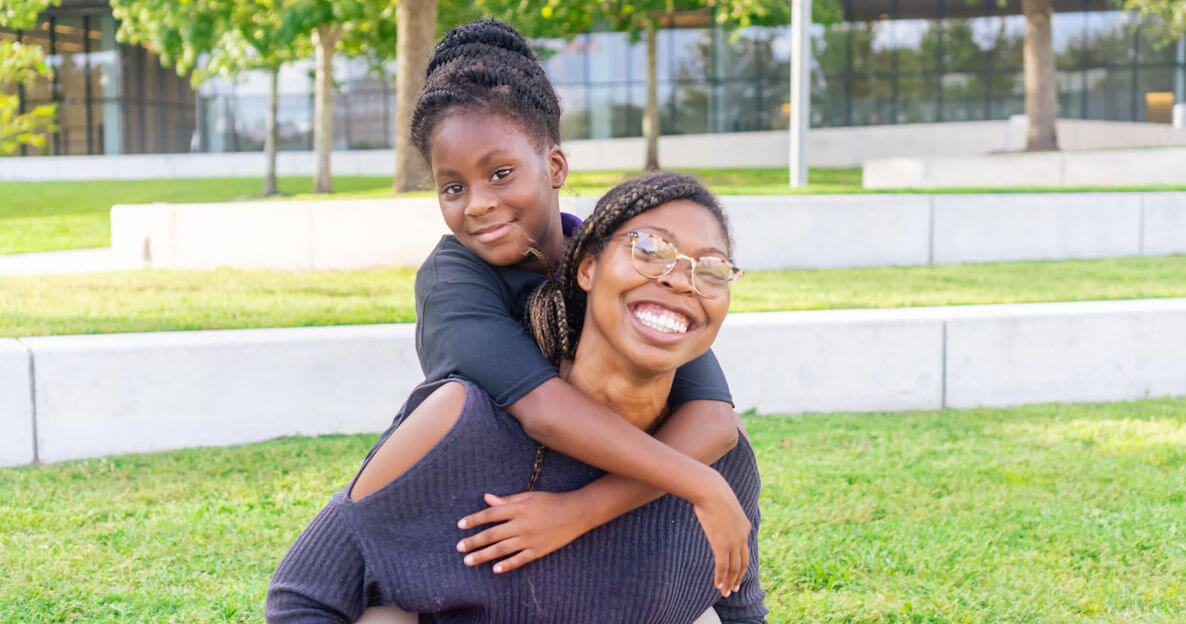We’ve known for years that Philadelphia is the poorest big city in the country, with more than 20 percent of residents — and approximately 100,000 children under 18 — surviving on $26,000 per year or less. What’s more, we know poverty is hard to escape: According to the Poverty Action Fund, 84 percent of children who are born into poverty will still be there in their late 20s.
Friends of The Children has a proven method for breaking that cycle. And now, the Portland-born nonprofit with impressive results is launching in Philadelphia.
As The Citizen first wrote in 2017, the goal of Friends of the Children is generational change via empowerment. It matches kindergarteners between the ages of 4 and 6 with professional mentors who commit to spending three to four hours a week with their charges for 12.5 years.
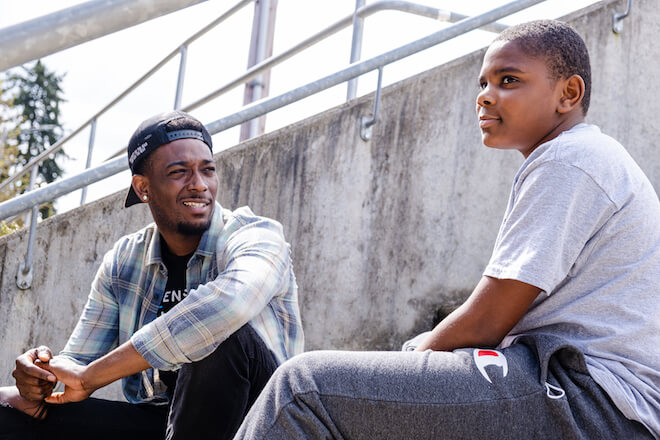
“It’s all about the power of relationships — long-term caring adults supporting children and families for the long-haul — from kindergarten through graduation, 12+ years, no matter what,” Friends of the Children CEO Terri Sorensen says. “By taking mentoring beyond volunteers to paid, professional mentors, we have the level of intentionality required to create generational change.”
The 30-year-old program has been successful in other cities: 83 percent of Friends participants earn a high school degree; 92 percent of those individuals enroll in post-secondary education, enter the military or join the workforce; 93 percent avoid the juvenile justice system. Nearly 100 percent hold off on having children until after their teen years, and 93 percent avoid the juvenile justice system.
Compare those figures to those to the national outcomes of children in foster care as tallied by the U.S. Department of Education and nonprofit University of Chicago’s Chapin Hall research center: 55 percent earn a high school degree; 74 percent avoid the juvenile justice system; and become teen parents. (More than 30 percent of Friends of the Children kids have been in foster care.)
“Friends of the Children is not going to solve generational poverty for the entirety of Philadelphia. We are a partnership. We are a piece (of the puzzle).” — Terri Sorensen, Friends of the Children CEO
With such impressive statistics, it’s no wonder that locals who learned about the program when Sorensen presented it during The Citizen’s Ideas We Should Steal Festival in 2021 jumped at the chance to bring it to Philadelphia. “It was 20 months from the event where we presented the idea to raising all of the seed capital and garnering our champions,” Sorensen says. “We only expand to communities that want us, and the invitation from the Philadelphia community was incredibly unique and special.”
The secret is time
The “Friends” as they’re called, meet the young people at school, at home, or in the community. They play games and help with homework, share stories and listen to concerns, support dreams and introduce ways to achieve them. They help their young person find their special skill and then encourage them to build on it.
The secret sauce, unlike other mentorship programs, is the time commitment. That’s possible because for the mentors, these children are part of their full-time, paying jobs. Each mentor works with up to eight children and collects routine data to measure progress. Participants may have more than one mentor during their time in the program. Friends has a “no matter what” guarantee, Sorensen says, promising to stick with participants.
The Philadelphia chapter will begin with 24 children living in Kensington and North Philadelphia, and three mentors. Friends works with foster care programs, schools and community organizations to identify potential participants.
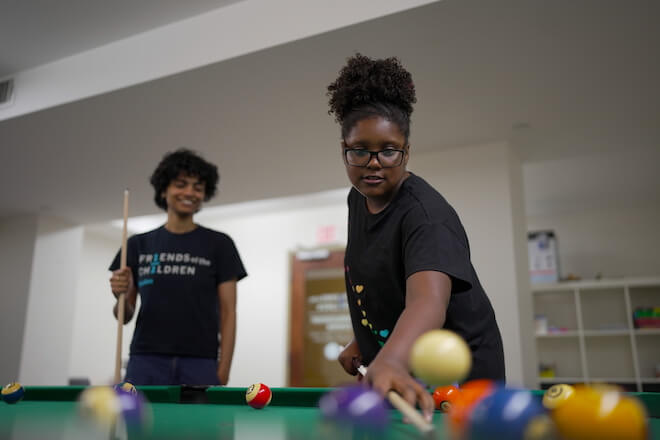
Philadelphia native Dwayne Wharton, who worked for the organization for about three years, now serves on the Philadelphia chapter’s Board of Directors. He was attracted to Friends because he himself “bounced around to four different high schools” and was the first member of his family to attend college. He was able to do that because of mentors.
“If it wasn’t for these people in my life who had a different perspective of what life could be for me, I don’t know where I’d be today,” says Wharton, who has worked in nonprofits for more than 25 years. “The biggest thing is really helping kids see themselves as capable and giving them the support to move towards that.”
When he worked with Friends, Wharton met mentors who’d been paired with their young people during the entire 12.5 years.
“It’s an amazing commitment to children,” he says. “There are a lot of mentoring efforts that exist, but this is unique in that it tries to meet their needs in an intense way.”
From Portland to America
Friends of the Children was founded in 1993 by Duncan and Cindy Campbell. It has since expanded to more than 30 cities, including Boston, Chicago, Los Angeles, and New York.
Duncan Campbell, who grew up in Portland, had a tough childhood. Both parents were alcoholics. His father was in and out of prison twice. He started the charity with the idea of providing stability to children growing up in similarly challenging circumstances, believing that identifying children who would benefit from the program at a young age — and paying their mentors — would result in quality and commitment.
As he told The New York Times in 2019, “Our core model is to take the most at-risk or most vulnerable child … If there are 100 kindergarten kids, we ask for the eight most troubled, most challenging ones.”
“It’s an amazing commitment to children. There are a lot of mentoring efforts that exist, but this is unique in that it tries to meet their needs in an intense way.” — Dwayne Wharton, Friends of the Children board member
Philadelphia has many children in need. A 2020 report from the Center for Urban and Racial Equality found that “police violence, gentrification, income inequality, and disproportionate impacts of Covid-19 on Black residents in Philadelphia reflect the consistent, patterned effects of structural racism.”
“Philadelphia, like many other cities, has been shaped by a history of structural violence and racial injustice,” Sorensen says. Just consider: 62 percent of children ages 0-5 in Philly live below 200 percent of the federal poverty level. A 2019 tally found that 40.2 Hispanic residents and 26.7 Black residents experienced poverty, compared to 12.7 percent of White residents.
The School District of Philadelphia has a graduation rate of 75 percent, and “Pennsylvania’s gaps in access to educational opportunity rank among the five worst nationwide in terms of both race and poverty,” Sorensen says.
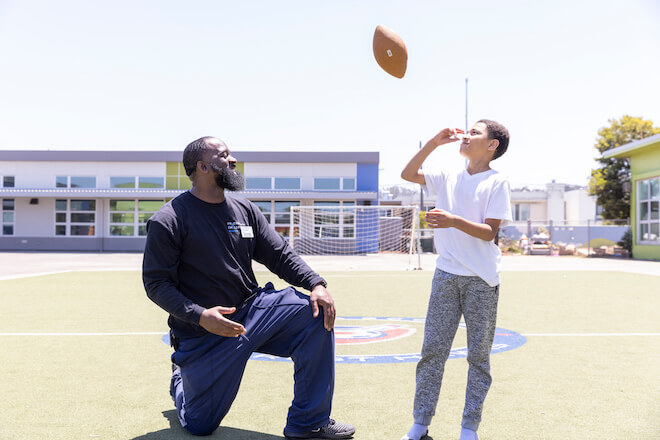
But bringing a program like this to the city is not only a moral imperative: It’s a financial one. An analysis by Harvard Business School Association of Oregon concluded that for every $1 invested in Friends, the community received $7 in saved social costs. That may be why the program has some high profile and high-dollar supporters. Philanthropist MacKenzie Scott gifted the national organization $44 million in 2022. Longtime program supporters Gary and Christine Rood gave Friends a $33 million gift earlier this year.
Basketball legend Michael Jordan has given the organization millions by donating all the proceeds from the multi-episode documentary about his life, The Last Dance — produced by Philly native Mike Tollin — and from the sale of a commemorative Michael Jordan Bulls Nike jersey.
World champion gymnast Simone Biles, who was in foster care until being adopted at age 5, has been a Friends of the Children ambassador since 2020, making personal contributions to its cause, promoting it on an international level, and donating her own time to Zoom meetings with participants.
In January 2023, Biles was onsite when the organization launched a chapter in Houston, her hometown. She included program participants when she announced the unveiling of her second Wheaties box, which includes a mention of Friends of The Children. In a March edition of People magazine, Biles noted that many program participants “are going to make an impact on the world because they have the support of Friends of the Children.”
Closer to home, the William Penn Foundation gave Friends of the Children $600,000. The K Ten Kids Foundation donated $250,000. The H. Chase Lenfest Foundation pledged $250,000. Progress Charitable Foundation pledged $125,000. The remaining startup money came from individual donations and a portion of the Scott gift.
For every $1 invested in Friends, the community received $7 in saved social costs.
Jennifer Stavrakos, William Penn’s interim program director and senior program officer, says Friends of the Children’s long history, unique process, and evidence-based success record played large roles in the foundation’s decision to support the organization.
“What really stood out is they use professional mentors who work full-time and are salaried, which cuts high turnover rates and allows (the mentor) to be in the kid’s and the family’s life for years,” she says, noting that mentors will also be paid a living wage of $53,000 to $60,000 per year. “This is a program that really values relationships.”
William Penn decision-makers also appreciated that Friends of the Children’s relationship focus includes partnering with local groups, including community and religious leaders, government and educational bodies, and local businesses and nonprofits.
“Friends of the Children is not going to solve generational poverty for the entirety of Philadelphia. We are a partnership. We are a piece (of the puzzle),” Sorensen noted at the Ideas We Should Steal festival.
A two-generation approach
Next steps for Philadelphia’s Friends of the Children include building out its board of directors; hiring an executive director, essential staff and mentors; and identifying and enrolling youth and families.
With its guaranteed 12.5 year commitment, Friends’ fund-raising efforts are far from over, says Brittany Merritt, the nonprofit’s national chief development officer. The $1.8 million seed money covers all costs in the program’s first year, 50 percent of its costs during the second, and 20 percent of its cost during the third.
In recent years, Friends of the Children has also adopted a two-generation (2Gen) approach, meaning mentors also work with their participant’s families or caregivers, helping them understand the children’s needs, connecting them to existing resources, and helping them find new educational and employment opportunities.
Wharton says working with the families enforces the idea that the program is not judging them and instead believes they’re part of the solution.
“People are often doing the best that they can, and what I’m seeing now is that family is an asset,” he says.
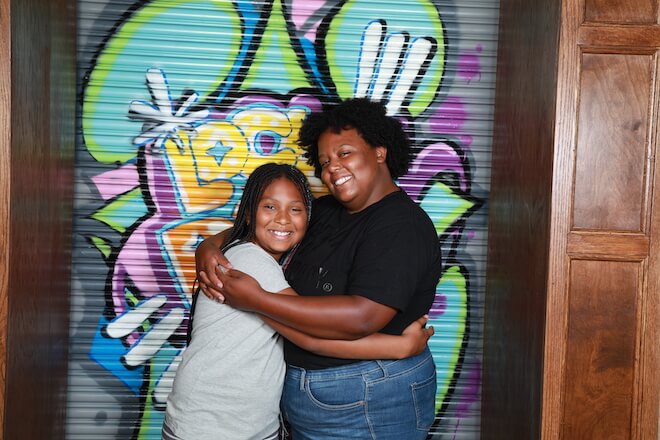
Early data and anecdotal evidence from the 2Gen approach is promising: 92 percent of families reported mentors have helped build connections that enrich and stabilize their lives. When a Tampa mother of seven lost her job, she first feared losing her housing, then feared losing her children. Her first call was to the trusted Friend working with one of her children. The Friend helped the woman find temporary housing support so the family could stay together while regaining its footing.
A few months after her grandson had been assigned a Friend, a grandmother approached one of the team members.
“She had tears in her eyes because she realized she had been overly critical of her grandson which was not improving his behavior,” Sorensen says. “The Friend’s interaction and support of her grandson had transformed him into a happy child who believed in himself.”
Corrections: A previous version of this post misstated the age of Friends for the Children, erroneously stated the status the H. Chase Lenfest Foundation’s pledged donation to the organization, and misspelled K Ten Kids Foundation, the Progress Charitable Foundation, and the surname of Brittany Merritt.
![]()
MORE ORGS THAT HELP PHILLY KIDS



